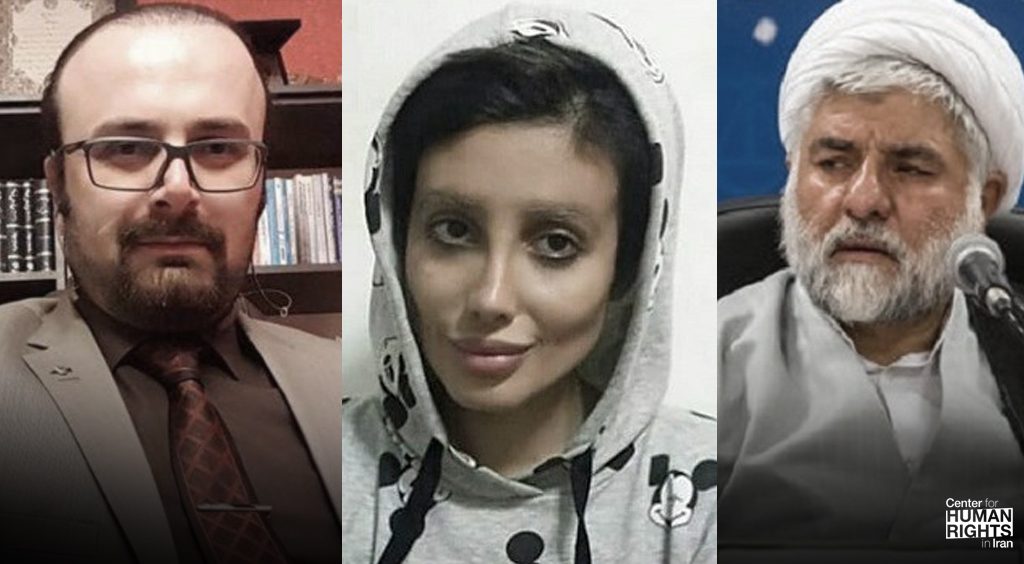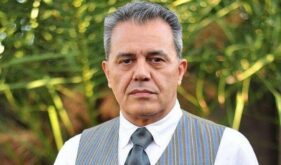CHRI – Detained teenage Instagram celebrity Fatemeh Khishvand is currently on a ventilator at Sina Hospital in Tehran after contracting COVID-19 in state custody, while the judge who holds the power to free her is unreachable, according to her lawyer.

“We find it unacceptable that this young woman has now caught the coronavirus in these circumstances while her detention order has been extended during all this time in jail,” human rights lawyer Payam Derafshan told the Center for Human Rights in Iran (CHRI) on April 15, 2020.
“It’s not the prison director’s fault that she’s behind bars,” he added. “The responsibility rests with Mr. [Judge] Moghiseh.”
Fatemeh Khishvand, 18, known on Instagram as “Sahar Tabar,” has been detained since being arrested in October 2019 amid a nationwide crackdown on Instagram celebrities. Her widely followed Instagram account contained photos of her in dramatically altered forms often with heavy makeup and costumes that depicted her as a zombie.
She is facing years in prison for engaging in peaceful freedom of expression on her personal Instagram account and has been charged with “corruption on earth,” “incitement to corruption by encouraging youth to engage in lunacy,” “insulting the sacred” and “acquiring illicit income”
Revolutionary Court Judges in Iran Hold Awesome Power With No Accountability
Presiding Judge Mohammad Moghiseh of Branch 28 of the Revolutionary Court repeatedly rejected requests to release Khishvand on bail, even though other prisoners of conscience have been temporarily released since the country’s COVID-19 outbreak, Derafshan told CHRI.
“We went to Mr. Moghiseh’s office many times and asked him to cancel the detention order and grant bail instead,” he said. “All the other people accused in this case have been released and our client is the only one who has remained in detention… But the judge said no.”
“When Judiciary Chief [Ebrahim] Raisi issued an order to release suspects before the [Iranian] new year [on March 20], we went to see Mr. Moghiseh and again he said no. And now that the coronavirus has spread, we keep looking for Mr. Moghiseh but we can’t find him in the courthouse. They say he’s there, but we haven’t seen him.”
Known as a judge that bends to the wishes of hardline state officials and security agencies in cases involving political charges, Moghiseh has sentenced numerous peaceful activists, dissidents and minorities to long prison terms under trumped-up national security charges.
In October 2018, Derafshan and fellow attorney Mohammad Moghimi attempted to sue Moghiseh for unlawful sentencing and displaying a lack of impartiality. But judicial officials operating in the country’s revolutionary court system are rarely held accountable for their actions while defense attorneys are imprisoned for peacefully doing their jobs.

An image from Kishvand’s Instagram account, which became unavailable after she was detained.
Instagram is the only major US-based social media network app that citizens are legally allowed to use in Iran. Due to traditional forms of advertising being severely censored or expensive in Iran, many Iranians heavily rely on the app for marketing their products and services.
Young Iranians are also increasingly using it to practice freedom of speech and expression, both of which are severely restricted in Iran.
On April 14, Mehdi Mohammadi, the director of Shahr-e Rey Prison where Khishvand was held, said Khishvand does not have COVID-19.
“It seems like it has become a habit for the authorities to deny everything,” Derafshan told CHRI. “It makes no sense to deny this. The prison director should acknowledge the infection and admit she has been hospitalized.”
Derafshan told CHRI that Moghiseh’s unexplained disappearance is likely affecting other peaceful prisoners who haven’t been able to advocate for their release because the presiding judge has not been available to hear their cases.
“The issue right now is wider than Fatemeh Khishvand’s case,” he said. “Many women in Shahr-e Rey Prison have contacted my colleague and me about the terrible situation inside the prison and the fear that exists among the inmates [due to the coronavirus].”
“Ms. Khishvand is our client and we have a duty to pursue her case, but we don’t know how many others are in the same state of limbo under temporary detention orders in various prisons in this country,” he added. “Unfortunately, many judges refuse to rescind detention orders and others have not been showing up to work since the virus broke out.”
Derafshan continued: “It will benefit the prisons to let the inmates go free. Many of the prison medical staff and health workers have gotten sick. But there are difficult legal obstacles. The judges who have issued detention orders must grant furlough to these prisoners. We want the authorities to issue a general order to allow these prisoners to be temporarily released. In the absence of judges who are sick or not coming to work, this is the only solution.”
Kishvand’s Coerced Statements Were Aired on State TV
After she was arrested, Iran’s flagship state television station, the Islamic Republic of Iran Broadcasting (IRIB), aired coerced statements by Khishvand in which she said she wanted “to be famous from a very young age, either as an actress or performer.”
IRIB has a documented history of broadcasting forced confessions. Typically well-staged productions, state and judicial officials use them to defame activists, dissidents, intellectuals and other individuals whom the authorities wish to discredit to legitimize their prosecution and amass public support for their convictions before they’ve been tried.
Derafshan has represented several clients who’ve been targeted by state intelligence agencies and the judiciary for political reasons including prominent human rights lawyer Nasrin Sotoudeh and the family of Kavous Seyed-Emami, an Iranian-Canadian sociologist and conservationist who died in state custody in February 2018.
No one has been held accountable for Seyed-Emami’s death.
In his latest report presented to the Human Rights Council, Javaid Rehman, the UN Special Rapporteur on the situation of human rights in the Islamic Republic of Iran, said he was seriously concerned about “overcrowding, poor nutrition and a lack of hygiene” in Iran’s prisons and at a recent press briefing called for all political prisoners to be released to protect them from COVID-19.
Read this article in Persian.
 Shabtabnews In this dark night, I have lost my way – Arise from a corner, oh you the star of guidance.
Shabtabnews In this dark night, I have lost my way – Arise from a corner, oh you the star of guidance.


